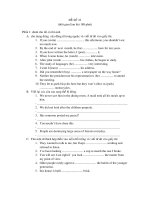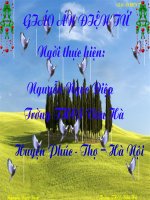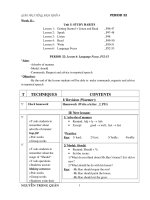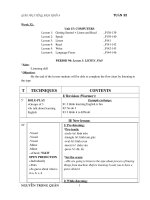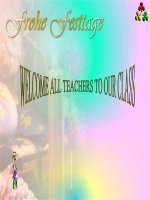- Trang chủ >>
- Sư phạm >>
- Sư phạm sử
anh 9tuan 32
Bạn đang xem bản rút gọn của tài liệu. Xem và tải ngay bản đầy đủ của tài liệu tại đây (245.92 KB, 8 trang )
<span class='text_page_counter'>(1)</span><div class='page_container' data-page=1>
Week : 32
Date of preparation: 11/04/2012
Period: 63
Date of teaching: 13/04/20112
<i>Test 4</i>
<b>I. OBJECTIVES: </b>
- By the end of this lesson, T will be able to test students’ knowledge and language
skills from Unit 8 to Unit 9.
<b>II. PREPARATIONS: </b>
papers
<b>III. MATRIX:</b>
<b>THEME</b>
<b>W</b>
<b>E</b>
<b>IG</b>
<b>H</b>
<b>T</b>
<b>IN</b>
<b>G</b>
<b>TOPIC</b>
<b> </b>
<b>RECONIGNATION</b> <b>UNDERSTANDING</b> <b>APPLICA</b>
<b>TION</b>
<b>TOTA</b>
<b>L</b>
<b>PRONUNCIATION</b> 5
%
Pronunciation of the
ending "ed"
Pronunciation of
sound” / u: /”/ ^ /
1/0.25/ M.
Choice
1/0.25/ M.
Choice
2/ 0.5
<b>VOCABULARY</b>
<b>GRAMMAR</b> 30<sub>%</sub>
VOCABULARY
Celebration
Natural disasters
GRAMMAR
Relative clause
Conditional
sentence :type 1
Prepositions
Although,Eventhou
gh
Phrasal verb
So
Wish
Adj +that
4/0.25/ M.
Choice
4/0.25/ M.
Choice
1/0.25/ M.
Choice
1/0.25/ M.
Choice
1/0.25/ M.
Choice
1/0.25/ M.
Choice
1/0.25/ M.
Choice
1/0.25/ M.
Choice
1/0.25/ M.
Choice
3/0.25/ M.
Choice
20/5
<b>SPEAKING</b> 5<sub>%</sub>
Give and respond to
compliments
Make predictions
1/0.25/ M.
Choice
1/0.25/ M.
Choice
2/ 0.5
m
<b>READING</b> 30
</div>
<span class='text_page_counter'>(2)</span><div class='page_container' data-page=2>
(150-180 words)
about
Celebration
Natural
disasters
Choice
4/0.5/M.Choic
e
4/12
<b>IV. TEST:</b>
<b>I - Choose the word whose underlined part is pronounced differently from the others.</b>
<b>(0,5)</b>
1.A. m<i><b>oo</b></i>n B. typh<i><b>oo</b></i>n C. fl<i><b>oo</b></i>d D. r<i><b>oo</b></i>f
2.A. hik<i><b>ed</b></i> B. strip<i><b>ed</b></i> C. claim<i><b>ed</b></i> D. collaps<i><b>ed</b></i>
<b>II. Choose a word in each line that has different stress pattern.(0.5)</b>
3. A. affect B. replacement C. humorous D. description
4. A. receipt B. profit C. language D. commerce
<b>III. There is a mistake in the four underlined parts of each sentence. Find the mistakes</b>
<b>(A, B, C or D)(0.5)</b>
5. I can’t find the book which Lan lent it to me last week.
A B C D
6. How about to use public buses instead of cars?
A B C D
<b>IV. Choose the best answer for each of the following sentences.(3.25)</b>
7. When a tropical storm reaches 120kph, it is called a _______ in North and South America.
A. hurricane B. cyclone C. typhoon D. tsunami
8. Passover is _______ in Israel and by all Jewish people.
A. connected B. equipped C. celebrated D. constructed
9. My neighbor’s house is _______ by solar energy.
A. widened B. heated C. cooked D. surrounded
10. The teacher divided our class ________ three groups.
A. between B. among C. with D. into
11. _______ to the Internet, we can get the latest information around the world.
A. Thanks B. Together C. Apart D. In addition
12. Mr. Pitt still lives in a small flat _______ he has a lot of money.
A. although B. even C. in spite D. despite
13. Mrs. Brown, _______ son won the first prize in the language contest, feels very happy.
A. who’s B. whom C. whose D. which
14. You should have a dictionary to _______ the words that you don’t know their meanings.
A. look up B. look for C. look into D. look after
15. If he _______ late, we will go without him.
A. comes B. came C. will come D. would come
16.. My father’s ________ is always the family.
A. priority B. achievement C. capacity D. growth
17. Family members ________ live apart try to be together at Tet.
A. they B. who C. whom D. which
18. Mai: well done,Trang
Trang:_________________________
</div>
<span class='text_page_counter'>(3)</span><div class='page_container' data-page=3>
19. ___________________________________. Because there may be a power cut.
A. You think we should buy candles B. We think we should buy candies
C. I think we should buy candles D. We think I should buy candles.
<b>V. Read the following passage and choose the best answer for each blank.(2)</b>
New Year’s Eve is the holiday (1) ________ New Year’s Day, on December 31, the
last day of the (2) ________ year.
In modern (3) ________, Western countries usually celebrate this day with a party (4)
________ culminates with a group countdown to the midnight hour. Party hats, noisemakers,
fire crackers and (5) ________ champagne are fairly common during this holiday.
Many municipalities also offer fireworks (6) ________ and other noisy ways to usher
in the new year. Places as Berlin, Chicago, Edinburgh, Los Angeles, London, New York,
Paris, Rio de Janeiro, Sydney, Toronto, and Tokyo are well-known (7) ________ their New
Year’s Eve celebrations
New Year’s Eve is also a work holiday in some countries, (8) ________ as Australia,
Argentina, Brazil, France, Mexico, the Philippines, and Venezuela.
1. A. before B. under C. follow D. during
2. A. moment B. current C. recent D. early
3. A. periods B. times C. phases D. eras
4. A. it B. when C. which D. who
5. A. throwing B. cooking C. eating D.drinking
6. A. displays B. exhibitions C. explosives D.
destructions
7. A. to B. with C. for D. into
8. A. so B. such C. just D. since
<b>VI. Read the passage below and choose one correct answer for each question.(2)</b>
Krakatoa (Indonesian name: Krakatau) is a volcano near the Indonesian island of
Rakata in the Sunda Strait. It has erupted <b>repeatedly </b>in known history. The best known of
these events occurred in late August 1883.
The 1883 eruption ejected more than six cubic miles (25 cubic kilometers) of rock,
ash, and pumice, and made the loudest sound ever recorded by human beings – the sound
was heard as far way as Perth in Australia (very far), and the island of Rodrigues near
Mauritius (very far). Many thousands of people were killed and injured by the eruption,
mostly in the tsunami (giant wave) which followed the explosion.
The eruption destroyed two-thirds of the what was then the island of Krakatoa. New
eruptions at the volcano since 1927 have built a new island, called <i>Anak Krakatau </i>(child of
Krakatoa).
1. What occurred for Krakatoa in late August 1883?
A. It started erupting B. The eruption of the volcano
C. The death of the volcano D. It stopped erupting
2. Where is Perth?
A. In Indonesia B. In Australia C. In Rodrigues D.
Mauritius
3. What followed the explosion of the volcano?
A. The tornado B. The earthquake C. The typhoon D. The
tsunami
4. What has been built by eruptions at the volcano since 1927?
</div>
<span class='text_page_counter'>(4)</span><div class='page_container' data-page=4>
<b>VII. Choose one option that best completes the second sentence.(1.25)</b>
1.It’s a pity I don’t know the way to the station.
I wish ……….
A. I know the way to the station. B. I knew the way to the station.
C. I can know the way to the station. D. I have known the way to the station.
2. In spite of being tired, Tam finished his homework.
Even though ………..
A. Tam was tired, he finished his homework. B. being tired, Tam finished his homework.
C. Tam is tired, but he finished his homework. D. tired, however he finished his homework.
3.Neil Armstrong / who / first / walk / moon / live / USA/.
A. Neil Armstrong, who first walked on the moon, lived in the USA.
B. Neil Armstrong who first walked in the moon lived in the USA.
C. Neil Armstrong, who first walks on the moon lives in the USA.
D. Neil Armstrong who first has walked in the moon lived in the USA.
4. We / worried / that / people / not / stop / throw / trash / along / street/.
A. We worried that people not stop throw the trash along a street.
B. We can worried that people aren’t stop throwing trash along the street.
C. We are worried that people don’t stop throwing trash along the street.
D. We were worried that people didn’t stop to throw trash along the street.
5. Everyone / feel/ hurry / so / sit / down / under / tree / and / have / snack/.
A. Everyone feel hungry, so he sits down under a tree and has snack.
B. Everyone felt hungry, so we sat down under a tree and had a snack.
C. Every one felt hungry, so they sat down under a tree and had a snack.
D. Everyone feels hungry, so you sit down under a tree and have snack
<b>Key</b>
I. 1-C 2-C
II. 3-C 4-A
III. 5-B 6-B
IV. 7-A 8-C 9-B 10-D 11-A 12A 13-C 14-B 15-A 16-A 17-B 18C 19-C
V. 1-A 2-B 3-B 4-C 5-D 6-A 7-C 8-B.
VI. 1-B 2-B 3-D 4-A
</div>
<span class='text_page_counter'>(5)</span><div class='page_container' data-page=5>
Week : 32
Date of preparation: 13/04/2012
Period: 64
Date of teaching: 17/04/2012
<b> </b>
<b>I. OBJECTIVES:</b>
-
By the end of the lesson, Ss will be able to talk about UFOs with basic information
received through discussion and the reading.
<b>II. PREPARATION: </b>
pictures, extra board.
<b>III. PROCEDURE:</b>
<b>TEACHER’S ACTIVITIES</b>
<b>STUDENTS’ ACTIVITIES</b>
1/ Warm-up:
<b> (8’)</b>
<b>Getting started</b>
- Ask Ss to look at the pictures and elicit the
meaning of UFOs.
- Ask Ss to work in pairs and discuss the
following questions.
<i>a. Have you ever heard of UFOs? Do you</i>
<i>think they really exist?</i>
<i>b. Have you ever seen any films on UFOs?</i>
<i>What are they about?</i>
<i>c. If you saw a UFO, what would you do?</i>
- Gather ideas and provide some facts about
UFOs (see supplements)
- Observe.
- Group in pair, find out the answers.
+ UFOs = Unidentified Flying Objects
- Listen.
2/ Presentation:
<b> (12’)</b>
- Ask Ss to look at
<i><b>Listen and read.</b></i>
- Elicit the new words.
<i><b>I. New words:</b></i>
1. Meteor (n):
sao băng
2. Alien (n):
xa lạ, ngời ngoµi hµnh tinh
3. Sample (n):
mÉu, lµm vËt mÉu
4. Spacecraft (n):
t u vị trơ
à
5. Egg – shape (a):
hình quả trứng
6. Plate – like (a):
hình đĩa
7. Treetop (n):
ngän c©y
- Play the tape and set the scene:
<i>"UFOs are </i>
<i>strange flying objects that some people</i>
<i>report that they have seen in the sky and</i>
<i>believed to be spacecraft from another</i>
<i>planet, Many scientists do not believe so,</i>
<i>they say that if people see a UFO, it might</i>
<i>be an aircraft, a weather balloon or a</i>
<i>meteor however, there is still evidence for</i>
<i>people believe in the existence of UFOs".</i>
- Open the book.
- Listen, guess and take note.
<b> </b>
- Listen and read.
</div>
<span class='text_page_counter'>(6)</span><div class='page_container' data-page=6>
3/ Practice:
<b> (15’)</b>
<b> </b>
<b>Activity 1:</b>
- Tell Ss to work in pair and find the words
in the text having meanings as in the book
instructed.
- Ask Ss to compare their answers with a
friend. Encourage Ss to guess the meaning
of the words in the context of the passage.
- Call on some Ss to read aloud their
answers in front of class. Ask Ss to explain
their answers.
- Feedback and give correct answers.
<b> </b>
<b>Activity 2:</b>
- Ask Ss to work in group and read the
passage to complete the sentences.
- Work in pair.
- Compare with friends, and then read
aloud.
<i><b>* Answers:</b></i>
1. Evidence
2. meteor
3. aliens
4. collecting
5. captured
6. disappeared
- Work in group to complete the sentences.
a. An aircraft, a weather balloon or a meteor
can be mistaken for an alien spacecraft.
b. ………. nine large round objects
traveling at about 2.800 meters an hours
c. ……….. over 1.500 sightings ……..
d. ……….. saw a UFO above their ……
e. ………. Saw an egg – shaped object in
one of his fields and also aliens collecting
soil samples ……..
f. ……… claimed they were captured by
aliens and taken abroad a spacecraft.
g. …… and his plane disappeared after
sighting a UFO…
h. ……….. that he saw a plate like device at
a treetop 30 meters away …
4/ Production:
<b> (8’)</b>
- Divide class into small groups. Ask them
to match the timeline in A to the events in B
when the game is finished, ask Ss to recall
the passage and present it to class.
<b>- Work</b>
in group.
<i><b>* Answers:</b></i>
1- c
2- e
3- a
4- b
5- f
6- d
5/ Homework:
<b> (</b>
<b>2’)</b>
- Have Ss:
+ Learn new words by heart.
+ Rewrite the sentences in notebook.
+ Prepare for the next period Unit 10: lesson
- Write assignments.
<b>A</b>
<b>B</b>
1. 1947
a. a woman
2. 1952
b. a farmer
3. 1954
c. Kenneth Arnold
4. 1964
d. a young pilot
</div>
<span class='text_page_counter'>(7)</span><div class='page_container' data-page=7>
2: Speak + Listen.
<b>IV. COMMENT:</b>
</div>
<span class='text_page_counter'>(8)</span><div class='page_container' data-page=8></div>
<!--links-->
